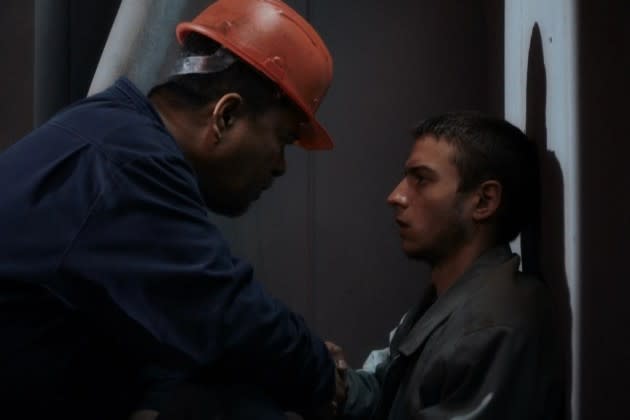Mihai Mincan Tapped into Existential Fear to Make Stowaway Thriller ‘To the North’

In writing the harrowing story of a Romanian stowaway trying to reach America aboard a cargo ship while hiding from merciless Taiwanese officers, Mihai Mincan found inspiration in the overwhelming fear that he once felt in his own dire predicament.
“To the North,” which screens in competition at the Thessaloniki Film Festival, is loosely based on the 1996 Maersk Dubai incident, in which the captain and officers of a Taiwanese container ship murdered three stowaways on two consecutive voyages by throwing them overboard. Crew members saved a fourth stowaway, keeping him hidden until they reached their destination.
More from Variety
It was cinematographer George Chiper-Lillemark (“Immaculate”) who first told Mincan about the incident.
“At first I didn’t know what to do with the story,” the writer-director recalls. “But a few years later it just clicked. I said, okay, I can make this film about what I feel; this is a film about fear: the fear of losing your life, of putting your life in somebody else’s hands. This is the way I can go into the script and this is the way I can write the story.”
He adds, however: “The context is as important as the story. I wrote the script in 2016. That was quite a strange period for me personally and for many Romanians too.”
The economic crisis that began in 2008 lasted longer in Romania than it did in the rest of Europe, he explains. Mincan found himself in a state of near poverty “and in constant fear of losing everything: your house, your job, everything. I was also father of a child of three years and I was also thinking about him and how I can provide for him. It was this constant feeling of fear.”
Europe was also hit by a series of terrorist attacks in 2016, including deadly incidents in Brussels, Nice and Berlin that killed 130 people.
“What I perceived was not an end-of-the-world feeling, but there was something bad floating in the air.”
The film’s ultimate story is very faithful to the way he felt six years ago when he wrote it, Mincan says. “But for me, what’s most important is that it tells a lot about today’s world. The world hasn’t changed. Unfortunately it hasn’t changed in these last six years.”
After directing two feature documentaries, “To the North” is Mincan’s first narrative feature.
Mincan’s background in journalism informed the way he told the story and shot the film, namely in a factual and objective manner, free of any emotional manipulation. It’s evident in the way he keeps a distance when examining things and presenting that view to the audience, he adds.
While the actions of the ship’s captain and his officers could easily be seen as monstrous, Mincan sought to understand their motivation. “It’s maybe not right in the way you or I would see it, but you could say, ‘Yes, what he says makes sense. He has to protect his crew and the ship and everything.’”
Mincan found his ideal leads in German-Romanian actor Niko Becker and Philippine thesp Soliman Cruz (pictured). The director describes Becker as “an amazing actor” and exactly what he wanted for the role of stowaway Dumitru. Having seen Cruz in Lav Diaz’s “Norte, the End of History” and impressed with his performance, Mincan contacted him in the Philippines, remaining in close contact through the two and a half years of the COVID-19 crisis.
Noting that he himself was the same age as the young stowaway in 1996, Mincan says the desperation of many young Romanians who dreamed of a better life in the U.S. was largely based on fantasy.
“If you compare the Romanians that went to America in the ’90s with the Romanians that are leaving Romania today to work abroad in Europe, there’s no comparison. Today everything is so well organized; you sign a contract, you go for six months to, let’s say, Germany to work as a truck driver or something. You know what kind of money you’ll get.
“In the ’90s everything was pure fantasy. We’d just come from 45 years of communism. We were thinking in terms of images, Coca-Cola, hamburgers, the music, everything. We saw ‘Dallas’ on TV – it was the only TV show that was allowed in that period.”
More significantly, however, was the adversarial political situation in Romania, which Mincan stresses remains a major factor behind people turning their back on the country.
The anger and hatred many Romanians feel towards their political elite has resulted not only in a strong sense of individualism, but also in the desire among many for a better life abroad.
“We’ve never felt secure, never, for the last 100 years, under any political regime. You always felt like at some point they’re just going to come and crush you.” The feeling still persists, he adds.
Mincan’s next project is a coming-of-age thriller set in a small Romanian town in 1989, some four months before the fall of Nicolae Ceaușescu’s communist regime, and revolves around a largely forgotten murder. The story follows an 8-year-old girl who witnesses the disappearance and killing of her older sister and the way she has to cope with the situation in a hostile environment.
Mincan has completed the script and has already secured partial funding from the Romanian Film Center (CNC). He hopes to start shooting the film in 2024.
Best of Variety
Sign up for Variety’s Newsletter. For the latest news, follow us on Facebook, Twitter, and Instagram.

